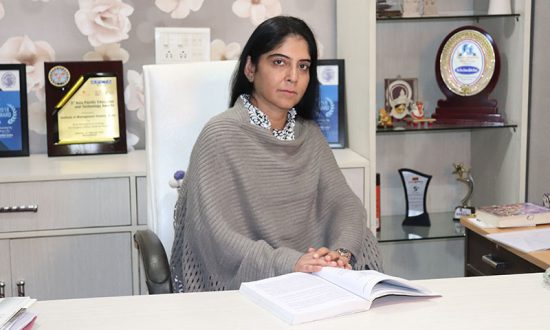Dr. Kulneet Suri, an MBA and an M.Phil in English Language, with Doctorate in Management from LTSNU (Ukraine) is currently Senior Director-International & Business Development at Institute of Management Study (IMS) Noida, IMS-DIA and DIT which is part of UNISON Society and has 11 Institutes in Noida and Dehradun. Dr. Suri is the Vice-President for CEGR, Delhi-NCR Chapter. She began her career with AIRTEL and has there on successfully risen by handing multidimensional assignments. On joining an educational institution, she has been heading all the major functions in the education Sector at various points in time. She has successfully handled operations from inception and then led them on a high growth path through meticulous strategy, planning and execution. She is responsible for the management and coordination of IMS Noida, IMS-DIA, and DIT and responsible for the development of new enterprise initiatives.
A team is a group of individuals, all working together for a common purpose. The individuals comprising a team ideally should have common goals, common objectives and more or less think on the same lines. Individuals who are not compatible with each other can never form a team. They should have similar if not the same interests, thought processes, attitude, perception and likings.
Management is essential in every walk of life. Even what we eat should be managed. You just can’t put anything in your mouth. One needs to be cautious. In the same way, a team must be managed effectively to expect the best from the team members. The team leader plays an essential role in managing his team well.
Benefits of teamwork:
Foster creativity & Learning
Creativity thrives when people work together on a team. Brainstorming ideas as a group prevents stale viewpoints that often come out of working solo. Combining unique perspective from each team member creates more effective selling solutions.
What you have learned from your individual experiences is entirely from your co-worker. Thus, teamwork also maximizes shared knowledge in the workplace and helps you learn skills you can use for the rest of your career. Collaborating on a project creates an enthusiasm for learning that solitary work usually lacks. Being able to share discoveries with the rest of your team excites employees and fosters both individual and team knowledge.
Blends Complimentary strength
Working together lets employees build on the talents of their teammates. While your strength may be creative thinking, a coworker might shine in organization and planning. Do not hesitate to share your abilities with the team.Often, a team works well together because team members rely on each other to bring individual talents to the table.
By observing the process behind these skills, you can learn how to combine your gifts and become a stronger team.Every time you see your coworkers utilize a different approach in sales, you have a chance to adjust or improve your methods.
Teaches Conflict Resolution Skills
Conflicts inevitably happen when you put together a group of unique people. Employees come from varied backgrounds and have different work styles and habits. While these unique viewpoints create the most successful work, they can also generate resentment that quickly turns into conflict.When conflict arises in teamwork situations, employees are forced to resolve the conflicts themselves instead of turning to management.
Build Trust
Trusting your teammates also provide feeling of safety that allows idea to emerge. It helps employees open up and encourage each other. Open communication is key when working on a team and produces effective solutions in difficult group projects.
Without trust, a team crumbles and cannot succeed on assigned projects. Great teams build each other up and strengthen individual members to create a cohesive group. By working together, employees learn that wins and losses affect everyone on the team. Teamwork necessitates confidence in each other’s distinct abilities.
Promotes a wider sense of ownership:
Team projects encourage employees to feel proud of their contributions. Tackling obstacles and creating notable work together makes team members feel fulfilled. Teamwork is not just helpful for employees. It benefits the employer in the long run as well. Employees that connect directly with their workplace are more likely to stay with the company. While employees leaving their jobs often cite a lacking salary, another common complaint is that their contributions do not seem to matter. Teamwork allows people to engage with the company and add to the bigger picture.




